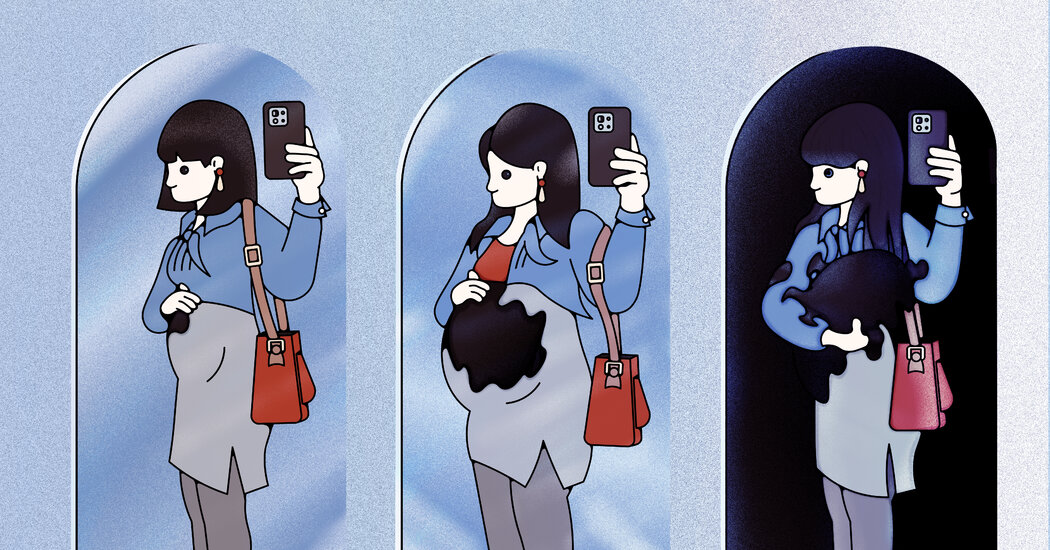Even the Idea of Motherhood Is Lonely

DIARY OF A VOID, by Emi Yagi, translated by David Boyd and Lucy North
Blame it on social media, on synoptic attention spans, whatever: The speculative conceit reigns in contemporary publishing, where few novels live up to their promise of revelatory social commentary. But a particularly good one can still tempt even the most cynical of readers. In the Japanese author Emi Yagi’s prizewinning debut, “Diary of a Void,” a single woman in her mid-30s, frustrated by her stupefying job at a company that manufactures cardboard cores for paper products, spontaneously decides to feign pregnancy in order to get out of menial tasks like making coffee and cleaning up after meetings — the stench of unappreciated labor aggravates her morning sickness. Over the course of the novel, she carries the lie to term.
“So this is pregnancy,” the narrator, known only by her last name, Shibata, thinks as the unexpected perks of pregnancy start accumulating. “What luxury. What loneliness.”
American readers, living in one of six countries in the world that don’t guarantee some form of paid parental leave, may find the notion that pregnancy can be a “luxury” less familiar than would a reader in Japan, whose Ministry of Health, Labor and Welfare issues a pamphlet, a “diary,” in which expectant mothers can track their pregnancy and childbirth.
Once Shibata “conceives,” she is permitted, no questions asked, to leave work at 5 p.m. every day and take a yearlong maternity leave (though the lack of overtime pay does cut into her budget). Encouraged by one of several invasive male co-workers to “do her very best to take care of herself,” she uses her new free time to hit up the grocery store before all the produce is picked over, cook herself elaborate, healthy meals and join “Mommy Aerobics” classes. (Her new lifestyle has led her to gain weight, and of course she’s conflicted: Plumpness, plus strategic shirt stuffing, helps her maintain the ruse.)
But a woman’s loneliness transcends national politics. It’s not only the lie that isolates Shibata from those around her — there are few friends or relatives in this short novel — but also the experience of being even hypothetically pregnant. Her male co-workers treat her with “deference,” and they’re also super annoying. “You’re finally getting into the spirit,” her desk neighbor comments when he sees the subway-appropriate maternity badge on Shibata’s bag one morning. The nosiest and most “helpful” of her colleagues, he has a feeling she’s carrying a boy, a prediction she makes come true later in the book.
If occasionally heavy-handed — an encounter with a stained-glass window depicting the Virgin Mary could have been more elusive — Yagi has a light touch for the endless ironies made possible by her premise. There is humor (“since I got pregnant” becomes a delightful refrain), but also the realization that the alienation of pregnancy and motherhood is no reprieve from the oppressive office culture that inspires Shibata’s experiment.
However, while the external pressures on Shibata’s body might ally her with actually pregnant people, her attempts to bond with them go nowhere, and not just because she can’t relate to what they’re going through physically. When an acquaintance from aerobics expresses anguish over her unhelpful husband, Shibata replies that she doesn’t understand. “I’m always so alone,” the narrator says. “That’s the way it is from the moment we come into this world, but I’m still not used to it — how alone we all are.”
As the lie starts to become surreal, palpable abdominal kicking and an apparently legitimate sonogram briefly make the reader think that maybe our narrator has actually been tricking us, or herself, all along. The novel’s conclusion is thankfully less pat: In the end we’re left with nothing but the void, “just big enough for one person.”
Lauren Oyler is the author of “Fake Accounts.”
DIARY OF A VOID, by Emi Yagi, translated by David Boyd and Lucy North | 213 pp. | Viking | $23
